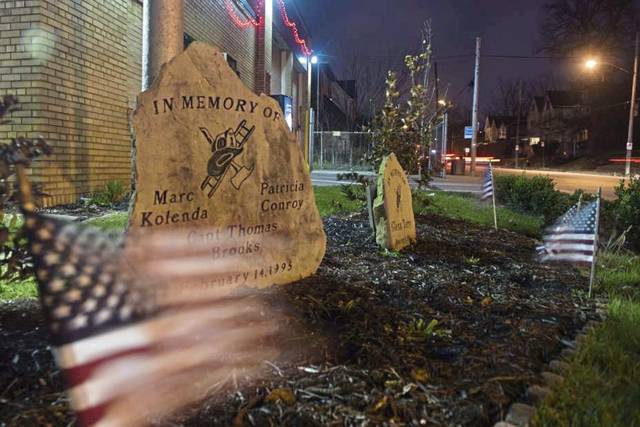https://triblive.com/local/appellate-court-says-man-can-be-retried-in-deaths-of-3-pittsburgh-firefighters/
Appellate court says man can be retried in deaths of 3 Pittsburgh firefighters

A federal appellate court said Tuesday that prosecutors can retry a man whose conviction in the 1995 deaths of three firefighters in the East Hills was overturned.
In a 19-page opinion, the three judge-panel from the 3rd U.S. Circuit Court of Appeals found that the federal retrial of Gregory Brown Jr., on a single charge of malicious destruction of property by fire resulting in death, does not violate his double jeopardy rights.
Just after midnight on Feb. 14, 1995, Pittsburgh firefighters responded to a home on Bricelyn Street. Several entered the basement. Marc Kolenda, 27, Patricia Conroy, 43, and Capt. Thomas Brooks, 42, were killed when a stairwell collapsed.
The Bureau of Alcohol, Tobacco, Firearms and Explosives investigated and said gasoline was found in the basement. They ruled the fire arson and offered a $15,000 reward for information on the case.
One witness, Keith Wright, offered testimony that undermined Brown’s alibi that he had been at the grocery store with his mother at the time of the fire. Another, Ibrahim Abdullah, said Brown admitted to him that he set the fire.
Brown was charged and prosecuted by a joint team of federal and state authorities. The case was heard in Allegheny County Common Pleas Court.
The prosecution alleged that Brown, then 17, started the fire at his mother’s request to collect on a renter’s insurance policy. His mother, Darlene Buckner, was also charged.
At trial, both Wright and Abdullah denied receiving any payment in exchange for their testimony.
Brown, now 43, was found guilty of three counts of second-degree murder and ordered to serve three consecutive terms of life in prison without parole.
Buckner was acquitted on second-degree murder and conspiracy charges but found guilty of insurance fraud. She was ordered to serve three years probation.
Over the course of the next 19 years, Brown repeatedly denied setting the fire and filed multiple appeals.
After working with the Innocence Institute at Point Park University, Brown learned that the two witnesses against him had been paid. Abdullah received $5,000. Wright received $10,000.
Following hearings on the issue, Allegheny County Common Pleas Judge Joseph K. Williams III found that there was prosecutorial misconduct in covering up the payments made in exchange for testimony.
He ordered that Brown receive a new trial, upsetting some of the family members and fellow firefighters of those who were killed.
The Allegheny County District Attorney’s Office appealed, but the state Superior Court agreed Brown was entitled to a new trial.
Ultimately, District Attorney Stephen A. Zappala Jr. withdrew the charges against Brown, and they were refiled in federal court by then U.S. Attorney David Hickton.
Brown was released from custody on bond in November 2016.
In federal court, Brown filed a motion to dismiss, arguing that the prosecution’s misconduct in his first trial violated his due process rights, and that a retrial would violate the double jeopardy clause.
On March 20, 2020, U.S. District Judge David S. Cercone denied Brown’s motion to dismiss, finding that under the concept of dual sovereignty, a state prosecution does not bar a subsequent federal one for the same crime.
In addition, Cercone found that double jeopardy does not prohibit a second prosecution if the first conviction is set aside “because of some error in the proceedings leading to conviction.’”
Brown then appealed to the 3rd U.S. Circuit Court, which heard argument on Jan. 26. His defense argued that even though Brown’s first prosecution was in state court, that it was “merely a tool of the federal authorities,” and that they led the original prosecution.
However, in their 19-page opinion, Judges L. Felipe Restrepo, Stephanos Bibas and David J. Porter said they did not even need to get to that question.
“Brown’s claim fails for a more obvious reason: retrying a defendant because the conviction was reversed for trial error is not a second jeopardy,” they wrote. “Regardless of whether it proceeds in state or federal court, Brown’s second prosecution does not violate the Double Jeopardy Clause.”
Instead, the court found that a retrial for prosecutorial misconduct would be barred only if the prosecution purposely goaded the defendant into moving for a mistrial.
In Brown’s case, there was no mistrial at all, the court wrote. Instead, he was granted a new trial years later during the appeals process.
“Brown’s success in getting his conviction set aside through collateral attack does not prohibit the government from retrying him,” the panel wrote. “Here, the prosecution’s failure to disclose the witnesses’ compensation demonstrates only ‘an overzealous effort to gain a conviction from the first jury and not … an attempt to subvert [Brown]’s ‘valued right’ by bringing the case before a second jury.’”
The case will now return to Judge Cercone.
David Fawcett, one of the attorneys who represents Brown, said the appellate court opinion will not deter them.
“This ruling does not change the fact that Mr. Brown is an innocent man who spent 20 years in jail because of government misconduct,” he said. “There was no crime committed. There was no arson. Only bad testing by government agents combined with illegally concealed witness payments allowed the government to even claim this was a crime in the first place.
“It’s sad to learn that the government is allowed to try a man twice when it is guilty of so much misconduct.”
Copyright ©2026— Trib Total Media, LLC (TribLIVE.com)
